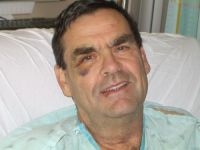
Bob Palmer, Portland, OR – 65 at time of event (2008)
 Bob had returned from a three-day conference on the Oregon Coast, enjoying the sunsets and luxurious accommodations. He had completed his usual daily walk around Mt Tabor, an extinct volcano, with his camera, and was eagerly downloading the pictures into Photoshop on his computer when he fell off his chair, face first onto the kitchen floor. The floor was not kind to his face.
Bob had returned from a three-day conference on the Oregon Coast, enjoying the sunsets and luxurious accommodations. He had completed his usual daily walk around Mt Tabor, an extinct volcano, with his camera, and was eagerly downloading the pictures into Photoshop on his computer when he fell off his chair, face first onto the kitchen floor. The floor was not kind to his face.
Like so many of his age group Bob does suffer from high blood pressure, and had done for many years without any adverse effects. Until that Tuesday evening in July.
“Neither my wife, Mary, nor I knew CPR, so there was none of that.” Bob said without emotion. She called 9-1-1 and, as the EMTs/fire personnel were located only a few blocks from the home, they arrived within minutes. He was defibrillated and “shipped off to the local emergency room, and later to Sunnyside Kaiser Hospital.” He spent nine days in ICU where they induced hypothermia and performed an angiogram. Finally a Guidant ICD was installed and he was sent home. Only Bob doesn’t remember any of this. He has other people’s memories of the incident, and some documents to support their stories. Some of the family even has photographic evidence—from which Bob is reconstructing the events.
“I didn’t know what a sudden cardiac arrest was. I thought I’d had a heart attack.” Bob hit the web to find out more. “There are two functions needed; you need to keep oxygenated blood moving, and defibrillation to fix the erratic arrhythmia.” Bob told me with confidence. “I’ve just learned that since leaving the hospital.” His statement reminded me that so many other people don’t know these simple facts. It took this near death for Bob to spend the time to find out. He and Mary will also be learning CPR in the immediate future.
Bob said, “Nobody has been able to give me an answer, when I ask them ‘Why did this happen?’” He’s hoping the cardiologist will find out, “but I’m not really optimistic” There is one area that Bob is certain “The angiogram was clear, and that would not have been [the case] if I’d had a heart attack. There would have been blockages.”
Bob also sought answers about changes in behavior. “I was always polite, and yet while in the hospital I was obstinate and problematic in terms of pulling things out, wanting to get up, wanting to get out. I wanted to leave!” We talked about the arm restraints used for intubated patients, and the discomfort of intravenous lines. But, mostly Bob wanted reassurance that this was normal for survivors. He then went on to explain he had met a fellow who had several subsequent events, and was curious about defibrillation therapy, “I want to know what to expect.”
Bob wants to do more, he knows there is a purpose to life, and believes survivors need support and answers. He is even considering establishing a local survivor group to help more people. Bob is going to retire soon, and knows his experience in the County adult care program would translate well. “Through all the coverage [of Tim Russert] and the National mourning, I didn’t realize it was a cardiac arrest nor did I understand what that term meant. He had some heart issues, but the event that killed him was sudden cardiac arrest,” Bob told me when we discussed the fact that SCA is prevalent, and that AEDs are so easy to use. “From what I’ve read—I’ve never seen or used one—but you just follow the voice, it walks you through it.”
-Jeremy Whitehead
